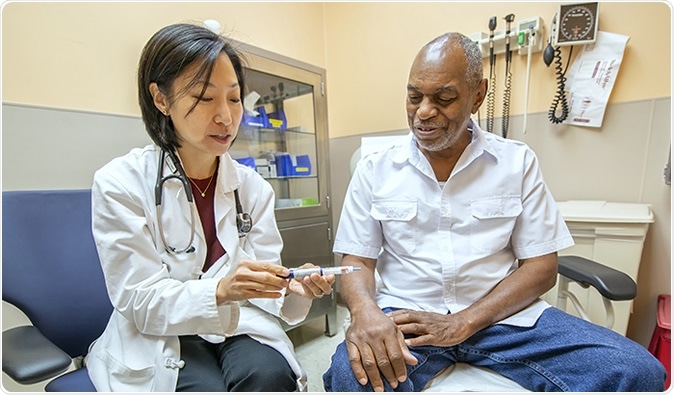A study that looked at Veterans Affairs treatment data has revealed that a random blood glucose test might be all that is necessary to predict which of the patients would go on to develop diabetes in the future over the next five years. The study titled, “Random plasma glucose predicts the diagnosis of diabetes,” appeared in the July issue of the journal PLOS ONE.

Dr. Mary Rhee, a physician-researcher with the Atlanta VA and Emory University, discusses the use of a glucometer with VA patient Joseph Fields. (Photo by Lisa Pessin)
The researchers from Emory University, the University of Colorado, Brigham and Women's Hospital, Harvard Medical School, and Boston University, write that the test could be predictive of development of diabetes in the next five years even if the blood levels are well within the normal limits. The team hopes that these findings could help researchers develop early treatment modalities for those at risk of diabetes and result in better outcomes. The researchers explained that using the serial records of plasma glucose in patients on their visits to the doctor, “could signal the need for further testing, allow preventive intervention in high risk individuals before onset of disease, and lead to earlier identification of diabetes.”
According to the American Diabetes Association, all persons should undergo routine blood tests looking at - a fasting glucose level, an oral glucose tolerance test, a HbA1c level or a random plasma glucose. A fasting blood glucose is performed after an overnight fasting on empty stomach. Oral glucose tolerance test mandates fasting and then taking a glucose load and getting tested again to see the body’s handling of the glucose load. HbA1c is called glycated haemoglobin and is a measure of the fluctuations of blood glucose over the past three months. Random blood glucose is measured when there are symptoms of diabetes. A random glucose level of over 200 mg/dl is indicative of diabetes. According to researchers, no overnight fasting or glucose meals are needed, a random blood glucose estimation is all that is necessary for detecting diabetes.
The researchers add that diabetes affects millions of people in United States and according to the Centers for Disease Control and Prevention (CDC), over 7 million Americans may be living with diabetes without being aware of it. They explain that changes in lifestyle and use of medications could help prevent or delay the progression of prediabetes to frank diabetes or prevent the worsening of existing undetected diabetes. They add that late diagnosis would often mean that diabetic complications could develop before treatment could be started.
Dr. Mary Rhee, lead author on the study and a physician-researcher with the Atlanta VA Health Care System and Emory University said in a statement, “Although screening for prediabetes and diabetes could permit earlier detection and treatment, many in the at-risk population do not receive the necessary screening.” Random blood glucose estimation earlier was not a recommended test for detection of diabetes.
For this study the VA researchers looked at routine random blood glucose results of 942,446 VA patients who were not diagnosed with diabetes previously. Each of these patients had at least three random blood sugar recordings over the past year. These random tests had been performed on the patient’s visit to the doctor “opportunistically” and with no prior preparation such as fasting or glucose load etc. The study included three VA health care systems from Atlanta, Boston, and Eastern Colorado.
The results revealed that over five years of follow up, 10 percent of the study participants developed diabetes. Diabetes was diagnosed in 94,599 among the participants and 847,847 remained non diabetic. The team could predict the development of diabetes from the elevated levels of random blood glucose accurately, they wrote. They explain that patients who had at least two random plasma glucose measurements of 115 mg/dL or more within a single year, were more likely to be diagnosed with diabetes within a few years. Those with levels over 130 mg/dL were even more at risk of developing diabetes, they wrote. The risk of diabetes was low among those with a random blood sugar level of 110 mg/dl or less.
The researchers added that not just the random plasma glucose values, other factors such as age, sex and race of the individuals as well as their body mass index (BMI), high cholesterol and smoking rates also influenced the diabetes risk. Significant risk factors for development of diabetes were high BMI, random plasma glucose and Black race. They however noted that random blood glucose values were more predictive of diabetes that other risk factors combined or alone.
The team advises that all patients with raised random blood sugar levels need to be followed up with a fasting glucose or HbA1c test if they have two random glucose tests showing levels 115 mg/dL or more. Using random blood glucose levels as a screening method could help devise early interventions and prevent progression of the diabetes or its complications. Rhee said, “These findings have the potential to impact care in the VA and in the general U.S. population as random plasma glucose levels--which are convenient, low-cost, and 'opportunistic'--could appropriately prompt high-yield, focused diagnostic testing and improve recognition and treatment of prediabetes and early diabetes.”
The study was supported by the VA Clinical Science Research and Development.
Journal reference:
Mary K. Rhee , Yuk-Lam Ho, Sridharan Raghavan, Jason L. Vassy, Kelly Cho, David Gagnon, Lisa R. Staimez, Christopher N. Ford, Peter W. F. Wilson, Lawrence S. Phillips, 'Random plasma glucose predicts the diagnosis of diabetes', Published: July 19, 2019, https://doi.org/10.1371/journal.pone.0219964